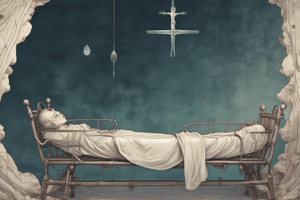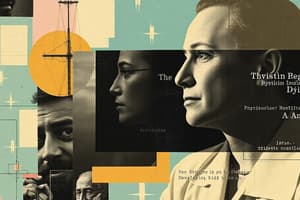Podcast
Questions and Answers
What is the underlying theme of the film 'Better Off Dead?' and why does Carr believe it is important to explore this topic?
What is the underlying theme of the film 'Better Off Dead?' and why does Carr believe it is important to explore this topic?
The underlying theme of the film is the connection between assisted dying and disability, and Carr believes it is important to explore this topic because she feels a duty of care to her friends who are part of the programme and wants to show that disability is not the greatest tragedy.
How does Carr's perception of disability differ from the common perception, and what does she want to convey through her film?
How does Carr's perception of disability differ from the common perception, and what does she want to convey through her film?
Carr's perception of disability is that it is not the greatest tragedy, whereas the common perception is that it is. She wants to convey that disability can be a huge life change, but it is not necessarily a tragedy, and that people with disabilities can still have fulfilling lives.
What was the impact of Carr's diagnosis on her life and relationships, and how did people react to her changed circumstances?
What was the impact of Carr's diagnosis on her life and relationships, and how did people react to her changed circumstances?
Carr's diagnosis turned her life upside down, and she was no longer seen as the popular kid. People reacted to her changed circumstances with rejection and cruelty, calling her an impostor and excluding her from social interactions.
What was the hardest scene for Carr to film in 'Better Off Dead?', and what did it reveal about her past?
What was the hardest scene for Carr to film in 'Better Off Dead?', and what did it reveal about her past?
How does Carr's background as a standup comic influence the tone of 'Better Off Dead?', and what does this reveal about her approach to exploring difficult topics?
How does Carr's background as a standup comic influence the tone of 'Better Off Dead?', and what does this reveal about her approach to exploring difficult topics?
What phenomenon on TikTok is driving online frenzies that encourage anti-social behaviour in the real world?
What phenomenon on TikTok is driving online frenzies that encourage anti-social behaviour in the real world?
What is the outcome of the online frenzies driven by TikTok, according to the BBC investigation?
What is the outcome of the online frenzies driven by TikTok, according to the BBC investigation?
Why do ex-employees say TikTok is not addressing the issue of online frenzies?
Why do ex-employees say TikTok is not addressing the issue of online frenzies?
What has TikTok previously distanced itself from, despite evidence of harm caused by the platform?
What has TikTok previously distanced itself from, despite evidence of harm caused by the platform?
How many episodes of harmful behaviour connected to TikTok were identified by the BBC investigation?
How many episodes of harmful behaviour connected to TikTok were identified by the BBC investigation?
Flashcards are hidden until you start studying
Study Notes
Liz Carr's Documentary on Assisted Dying
- Liz Carr's documentary, Better Off Dead?, is about to air on BBC One, making the case against assisted dying.
- Carr has been wanting to make this program for years, since the documentary Terry Pratchett: Choosing to Die aired in 2011.
Background and Inspiration
- Liz Carr is a 52-year-old actress and former stand-up comedian who has appeared in TV shows such as Silent Witness, Good Omens, The Witcher, and Loki.
- She has also performed in The Normal Heart at the National Theatre, winning an Olivier Award.
- Carr was diagnosed with a rare autoimmune condition at the age of 7, which significantly impacted her life.
The Documentary
- The documentary examines the topic of assisted dying and disability, which Carr believes cannot be separated.
- It features personal stories, including Carr's own experiences, and those of her disabled friends who have been told they would be better off dead.
- One of the friends, Jamie Hale, has even had someone offer to kill him.
Personal Story
- Carr grew up in Wirral, was a popular kid, and was fit and smart before her diagnosis.
- Her family moved to the US for two years, where she became ill and her life changed significantly.
- Carr became a wheelchair user at the age of 11 and was told by a doctor that she wouldn't live to be old.
Emotional Impact
- The hardest scene for Carr to film was the one in her mum's kitchen, where her mum reads aloud from diaries kept during that period.
- The diaries reveal Carr's feelings of loneliness and despair, and her desire to die rather than carry on.
Studying That Suits You
Use AI to generate personalized quizzes and flashcards to suit your learning preferences.




